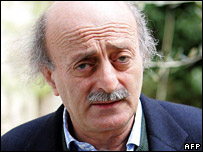 By Lin Noueihed, BEIRUT, Jan 15 (Reuters) – A row between Hizbollah party and Druze leader Walid Jumblatt has plunged Lebanon deeper into a political crisis that has paralysed the government and divided the country along sectarian lines. In an unprecedented attack on Saturday, Jumblatt accused Shi’ite Muslim Hizbollah of hiding behind its "weapons of treachery", capping a month-old campaign against the group that is under pressure to disarm in line with a U.N. resolution. Hizbollah, close to Syria and Iran, responded with a biting attack against Jumblatt, the most outspoken critic of Syria’s domination of Lebanon after the 1975-1990 civil war.
By Lin Noueihed, BEIRUT, Jan 15 (Reuters) – A row between Hizbollah party and Druze leader Walid Jumblatt has plunged Lebanon deeper into a political crisis that has paralysed the government and divided the country along sectarian lines. In an unprecedented attack on Saturday, Jumblatt accused Shi’ite Muslim Hizbollah of hiding behind its "weapons of treachery", capping a month-old campaign against the group that is under pressure to disarm in line with a U.N. resolution. Hizbollah, close to Syria and Iran, responded with a biting attack against Jumblatt, the most outspoken critic of Syria’s domination of Lebanon after the 1975-1990 civil war.
Syrian President Bashar al-Assad flew to Egypt and Saudi Arabia last Sunday for talks on Lebanon, though Damascus has since rejected a U.N. request to question him over the case. Lebanon’s sectarian political system is showing the strains of divisions over Damascus. Renewing pressure on Syria and backing for its opponents in Lebanon, the United States urged Damascus on Saturday to stop obstructing the inquiry or risk further action in the U.N. Security Council. Assistant Secretary of State David Welch was met by dozens of pro-Syrian students protesting against his visit to Beirut and what they see as U.S. interference in Lebanon. The protest, dispersed by riot police using tear gas and water cannons, sparked spontaneous counter-demonstrations against Hizbollah and its pro-Syrian allies and raised fears of a slide into violence. NO END IN SIGHT Lebanon has been locked in a political crisis since the five Shi’ite ministers in cabinet suspended their participation after it voted to call for the U.N. inquiry to be expanded to include a series of political killings that have plagued the country. The Shi’ite ministers, all loyal to Hizbollah and its Shi’ite ally Amal, opposed that call and a demand for an international tribunal to try Hariri’s killers, but were outvoted by ministers who had campaigned with him for Syria to withdraw its troops from Lebanon in April after 29 years. Negotiations to return the Shi’ite ministers to the government have faltered over a Hizbollah demand that its armed wing be considered legitimate and not a militia that must disarm under U.N. resolution 1559. Hizbollah, the only Lebanese group to keep its weapons after the war, was instrumental in ending Israel’s 22-year occupation of southern Lebanon in 2000. But calls for it to disarm have grown louder since its Syrian allies withdrew last year. In its own statement, Amal accused Jumblatt of undermining all efforts to bring the Shi’ite ministers back to the cabinet. "The negotiations have not made any progress so far. The Shi’ite ministers will not resign and it is an open crisis in the government," said Ali Hassan Khalil, an Amal member of parliament and negotiator. (Additional reporting by Laila Bassam)



